10+ Vegan Diet Dangers (Plus Signs to Watch Out For)
Before you think about going vegan, learn about ten potential dangers and health risks that can result from a plant-based diet. You need to know about the increased risks of nutrient deficiency and disease, including one risk that is irreversible. I’ve also included a list of signs of an unhealthy vegan diet so you know what to watch out for.
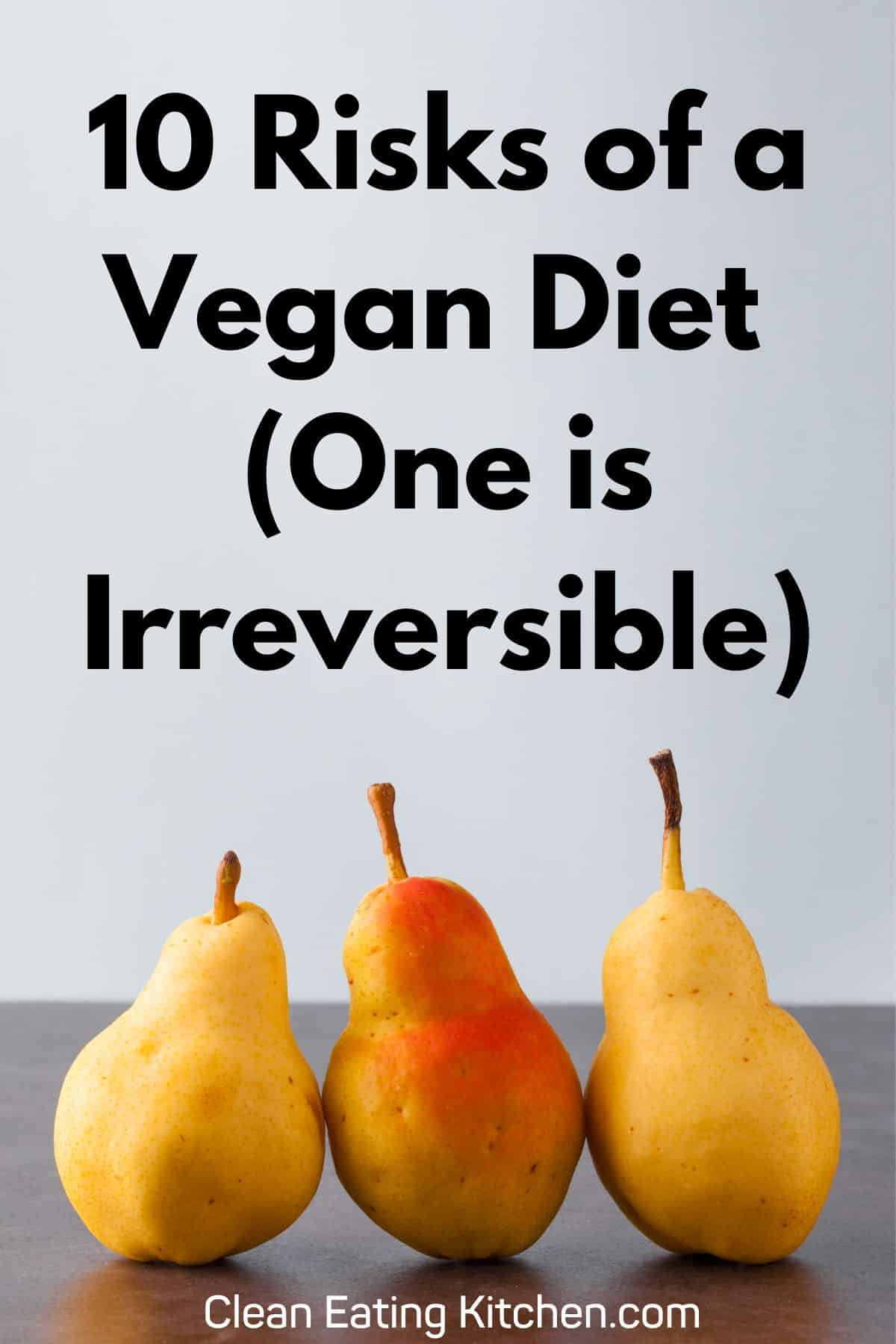
Have you ever wondered if a vegan or plant-based diet would help you manage your weight and resolve any nagging health problems? That’s the promise that is often made around this trend.
But, you hear less about the health problems that can occur from a strict plant-based diet that excludes all animal products. This article includes ten reasons that may dispel the myth that veganism is the healthiest diet and works for everyone.
I’ve also included some suggestions for how to counter these potential health risks of a vegan diet.
What Is a Vegan Diet?
What is a vegan diet? Simple put, a vegan diet is one that excludes any food that comes from an animal. This includes eggs, dairy, meat, fish, poultry, and even honey.
Some people take a vegan diet even further and embrace it as a lifestyle, and will not purchase or use any clothing or personal care products that include animal-based ingredients.
Whole foods, plant-based diets
A “whole foods, plant-based diet” is more often the term used for an approach that includes fewer processed foods, and a greater emphasis on fruits, vegetables, legumes, grains, nuts, and seeds.
However, even that term can get confusing as paleo diets are considered to be a plant-based approach, but they do include animal products.
Learn more about the differences between clean eating, paleo, vegan, keto, and Whole30 diets or the differences between vegan and vegetarians.

What vegans eat
If a vegan or plant-based diet does not include any animal products, then what does it include?
Vegans can eat vegetables, fruits, whole grains, soy, legumes (beans), nuts, and seeds.
A vegan diet doesn’t necessarily means it’s healthy, though, since it by definition does not exclude a lot of processed foods, sugar, or gluten.
Just look at the popularity of fake meats which are incredibly processed and not necessarily healthy by any stretch of the imagination. See my related article on the potential dangers of plant-based meats.
The healthiest vegan diet is likely a plant-based diet that also is one of the best diets for climate change.
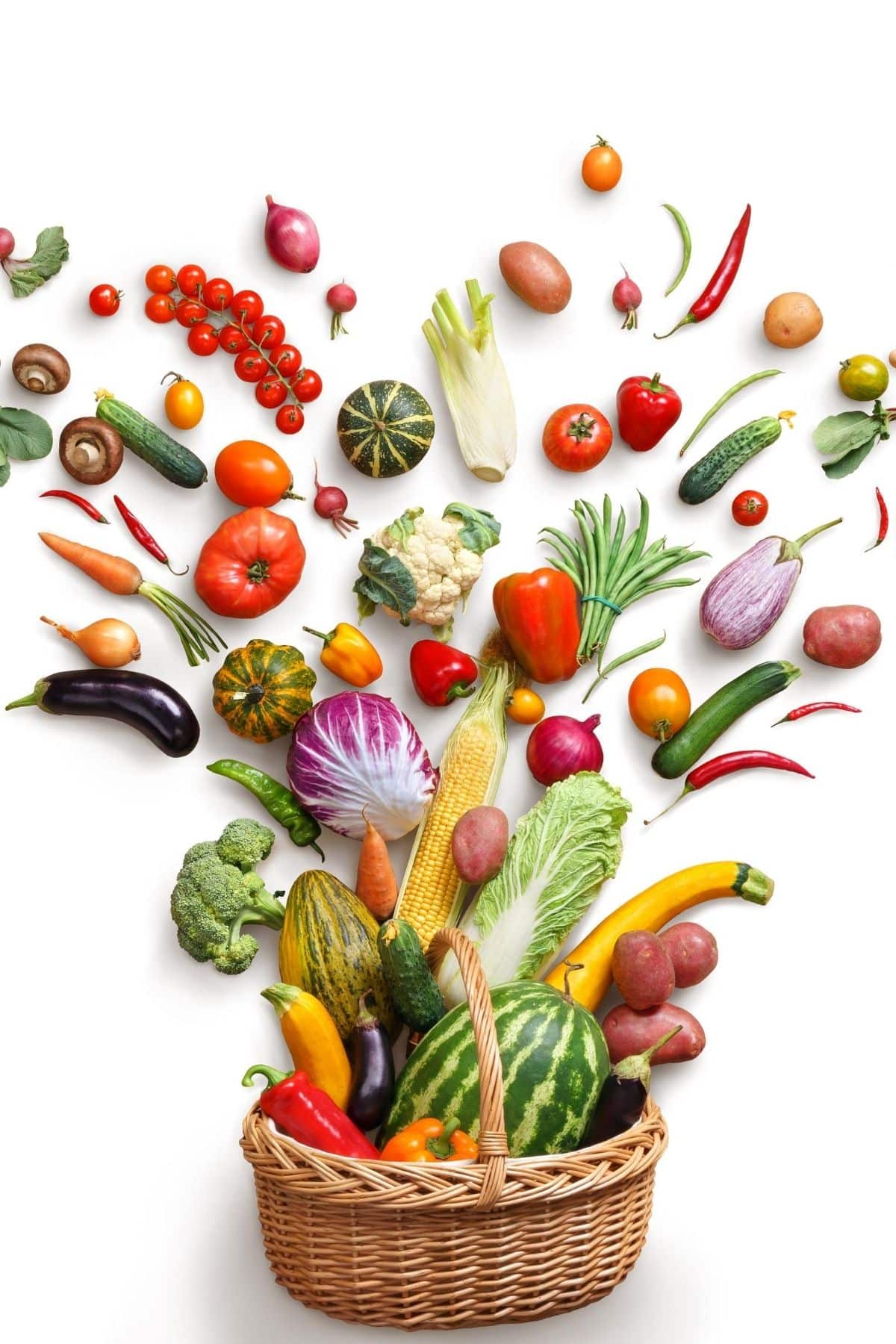
A vegan diet is an extreme diet
Although some people may thrive on a vegan or plant-based diet, it should be noted that it is considered an extreme diet because of how many foods it excludes, as well as the potential for nutritional deficiencies.
This article includes ten real problems with a plant-based diet, including my experience as a woman whose health declined as a result of being on a strict vegan diet.
If you are 100% committed to eating a vegan diet but you are always feeling tired, you might also want to read my article with tips for how to reverse fatigue on a vegan diet.
This article includes links to scientific studies whenever possible.
However, some of these potential diet dangers are anecdotal and not based on human studies. So, as always, it’s important that you consult your healthcare provider to help determine what type of diet is best for you.
Ten Potential Vegan Diet Dangers
Please note, my intent with this article is not to discredit any of the benefits that can result from eating more plant foods, but to provide cautionary evidence of what can happen if a vegan diet is taken too far and warning signs are ignored.
1. Risk of anemia due to a lack of heme iron
Iron-deficient anemia is the most common nutritional deficiency in the world, and both vegans and vegetarians are at higher risk of this condition.
While plant foods contain a form of iron, it is called non-heme iron and it is much less absorbable by the body.
Iron-deficient anemia can lead to serious symptoms including fatigue, and women of child-bearing age should be aware of how a vegan or vegetarian diet can quickly lead to anemia.
See my related post on how to eat to support your menstrual cycle.
While iron supplements can be taken to help reverse or prevent anemia, most women dislike taking iron supplements because potential negative side effects including constipation. It can also be difficult to take enough iron supplements to overcome anemia, especially without eating animal sources of iron.
See my list of the best vitamins for women over 30 or the best vitamins for a teenage girl which include iron to help boost ferritin levels.
You may also want to consider adding cricket protein to your diet. While eating insects is not normally accepted in a vegan diet, it may be a lower-impact way of adding animal protein back into your diet without eating animals like cows, fish, or chicken.
Having your ferritin levels checked regularly if you are a woman of child-bearing age is essential to ensure you don’t become anemic on a plant-based diet. See my article on how to order lab tests without a doctor.
You may also want to consider cooking with a cast iron pan (see my list of the safest cookware material).
Eating therapeutic meat
If you cannot raise your iron levels on a plant-based diet and you are at your wits end, you may consider something called eating “therapeutic meat.” The idea is that you eat just enough meat to raise your iron levels and then go back to a non-meat lifestyle.
This is a practice that is becoming more popular and may be something to consider. It is similar to getting a religious exception to eat certain foods not usually allowed in that religion unless you are sick or elderly.

2. Increased risk of depression with low omega-3 fatty acid intake
Without a food source of omega-3 fatty acids from fish or fish oils and an increased consumption of omega-6 fatty acid from foods like nuts, vegans might be at higher risk from depression.
Algae-based sources of omega-3 fatty acids are an option, but they can be expensive and hard to find. And, since many vegan diets may include a higher than average intake of nuts, the balance of fatty acids in the body can still get off-balance.
There are issues associated with low omega-3 levels and some are quite serious. Pregnant women also need to be extremely aware of their omega-3 intake as the fatty acids help nourish the fetal brain development.
Omega-3 fatty acids can be tested through a blood test, and should be monitored if you start experiencing symptoms of depression or anxiety. Please do contact a healthcare professional as soon as you think you might be depressed, as you don’t want the symptoms to get worse.
Once you have your levels tested, you can use algae-based omega-3 supplements to help increase your levels. In the worst case scenarios, you can consider taking a fish oil supplement to get your levels stabilized.
You may also want to consider the best magnesium supplements to help with anxiety.

3. Risk of Vitamin B12 deficiency
Since vitamin B12 is only available in animal foods, vegans are at a much higher risk of developing a deficiency in this vital nutrient.
In fact, most nutrition professionals agree that those on a vegan or vegetarian diet must supplement with a high-quality vitamin B12 supplement to avoid irreversible health conditions that can result from deficiency.
It should also be noted that many people have a genetic variation known as MTHFR that can impact how B vitamins are absorbed. In this case, even certain B vitamin supplementation might not be enough to prevent a deficiency.
Read more about the best MTHFR diet and supplements.
If you are at all concerned that you aren’t getting enough vitamin B12 in your diet, then ask your doctor for a vitamin B12 test.
If it turns out you are low in vitamin B12, then you may need to get an injection or use sublingual supplements, plus have your levels monitored regularly.
You may also need to monitor your intake of vitamin B2 (riboflavin) and vitamin B3 (niacin), as these can also be lower on a vegan diet.

4. Inhibition of zinc absorption on vegan and vegetarian diets
Similarly to deficiencies that can occur with vitamin B12, vegan and vegetarian diets can result in low zinc status.
It is theorized that the problem in this case is that higher consumption of plant foods containing phytic acid may inhibit the ability of the body to absorb zinc.
Because of this potential issue with zinc absorption, it is often recommended by nutrition professionals that vegans and vegetarians should increase their intake of zinc up to 50% of the recommended daily allowance to ensure adequate levels.
Good zinc levels are really important for boosting the immune system so it’s important to make sure you’re eating enough food sources of zinc or that you take a zinc supplement.
Plant-based sources of zinc are not as bioavailable as animal sources, so make sure you are getting enough from food sources or from supplements. Be careful with zinc, though, as you don’t want to take too much.

5. Low intake of iodine
Without quality sources of seafood, there is a real risk of not getting enough iodine in both vegan and vegetarian diets.
Iodine deficiency is problematic and can lead to hypothyroidism and other complications.
Vegans and vegetarians can supplement with iodine by using iodized salt or eating seaweed products. But, deficiencies still persist.
6. Not consuming enough calcium
Another nutrient deficiency that can occur with dairy-free, vegan, and plant-based diets is calcium deficiency.
While you can get calcium from plant-based foods, there is generally less calcium than in dairy products. And, plant foods often contain phytates and oxalates than inhibit the absorption of calcium.
A long-term risk of inadequate calcium intake is an increased risk of bone fractures.
If you cannot or do not want to consume dairy products, be sure you are taking a calcium supplement or consuming fortified plant-based milks.
7. Risk of consuming too much carbohydrate
Vegan diets are generally lower in protein and can cause blood sugar swings in certain individuals. There is also the risk of over-consuming carbohydrates on a vegan diet, especially since legumes are often consumed as a protein source, but are very high in carbohydrates.
Vegans may also replace the calories from protein sources with refined carbohydrates including bread, crackers, and cookies.
Over-consuming carbohydrates can lead to non-alchoholic fatty liver disease, blood sugar disregulation, and other troublesome symptoms. See my articles on how to follow a sugar-free diet and how to do a sugar detox.
You may also need to consider eating more complex carbohydrates like sweet potatoes as opposed to eating simple carbohydrates like crackers or bread.
You may also want to check out this article on the best gluten-free carbohydrates if you are unsure about which ones you should be eating.
8. Not eating enough high-quality protein
Eating a diet that includes moderate to higher levels of protein has been shown to have a positive effect on satiety and weight management. It can be harder to find quality sources of protein on a vegan diet that aren’t also carbohydrate sources (like beans) or are soy-based.
Without a quality source of lean protein in the diet, vegans may experience fatigue or low exercise tolerance. If that is the case, you may need to consider adding protein powder to your diet.
See my list of the best clean protein powders.
One risk of not eating enough protein is sarcopenia, or muscle wasting. This may be particularly true for older adults who are on vegan diets.
9. Risk of disordered eating
Orthorexia is a type of eating disorder that is defined by an over-fixation on healthy eating patterns. It can result in over-restriction, obsession, and other serious eating disorders.
At least one study found that vegans and vegetarians tended to display more orthorexic eating patterns, and most eating disorder specialists do not recommend restrictive diets such as veganism or vegetarianism for people trying to recover from an eating disorder such as orthorexia.
Read more about orthorexia and food obsession.
If you find that your eating disorder is getting worse on a vegan or plant-based diet, then you should consider working with a qualified therapist to help work on increasing your body weight.
In the worst case scenario, your therapist may advise you to consider moving away from a vegan diet while you repair your relationship with food.
You may also need to consider eating more calorie-dense foods if you are recovering from an eating disorder. See my 1,000 Calorie Weight Gain Smoothie or my list of the best Weight Gain Smoothies for recipe inspiration.

10. Processed soy issues
Again, as a result of excluding all forms of animal protein, many vegans turn to soy as a protein source.
While unprocessed forms of soy may be okay for some people, processed forms of soy are commonly found in a vegan diet, including tofu, soy milk, and soy-based processed foods sold as meat substitutes.
Processed soy foods are no better for human health than any other highly-processed foods, but with the added risk of hormone interference due to phytoestrogens found in all forms of soy.
Soy has also been found to be a contributor to the intake of the toxic metal cadmium in vegans and vegetarians.
Read more about the potential dangers of eating soy.
To help counteract or avoid any negative results from eating too much soy, you may consider eating fermented soy sources such as tempeh, or limiting your soy consumption to several times a week. You may also wish to avoid non-organic forms of soy which can be a source of GMOs in the diet.
If you do choose to consume soy, try making healthy recipe as opposed to buying processed versions. I recommend my Air Fryer Tofu as a great option.

Additional health risks associated with veganism
While some of the health risks of a vegan diet are outlined above, this list is not complete.
There are other risks of a plant-based diet including becoming isolated from friends and family due to an extremely restricted diet, the risk of eating too many high histamine foods and developing histamine intolerance, the risk of triggering a gluten intolerance when consuming too many gluten-containing foods, and other risks including inadequate intake of vitamin D.
The bottom line is that a vegan diet is not natural for humans and most cannot stick with it (up to 84% of vegans and vegetarians end up eating meat again).
While it can be used on a short-term basis for weight loss or for other health reasons, it may result in significant nutritional deficiencies over the long term as well as other risks including eating disorders and isolation.
This is especially true if a vegan is not taking supplements and is not being closely monitored by a healthcare professional with regular blood work.
Signs of an Unhealthy Vegan Diet
An unhealthy vegan diet, like any poorly planned diet, can lead to various nutritional deficiencies and health issues such as the ones mentioned above.
Still, you may not know if your vegan diet is letting you down until you start experiencing symptoms or signs of deficiency. Here are some signs that a vegan might not be getting a balanced diet:
- Fatigue and Weakness: This can be a sign of iron deficiency anemia, common in those not consuming enough iron-rich plant foods or vitamin C, which enhances iron absorption.
- Poor Skin Health: Dry, pale, or bruised skin might indicate deficiencies in vitamins and minerals like vitamin A, vitamin C, and zinc.
- Hair Loss and Brittle Nails: This can result from inadequate protein intake or deficiencies in vitamins and minerals like iron, zinc, and vitamin B12.
- Dental Issues: Problems like bleeding gums can be a sign of vitamin C deficiency, while weak enamel might indicate a lack of vitamin D.
- Digestive Problems: Persistent digestive issues may be due to a lack of dietary fiber, often found in fruits, vegetables, and whole grains, or from overconsumption of processed vegan foods low in fiber.
- Mood Changes and Cognitive Problems: Deficiencies in omega-3 fatty acids, vitamin B12, and iron can affect mental health, leading to issues like depression, anxiety, or difficulty concentrating.
- Frequent Illnesses or Slow Healing: This might indicate a weak immune system, possibly due to deficiencies in essential nutrients like zinc, vitamin C, and vitamin D.
- Unintended Weight Changes: Sudden weight loss might result from not consuming enough calories, while weight gain might occur from over-reliance on processed vegan foods high in sugar and fat.
- Bone or Joint Pain: This could indicate a deficiency in vitamin D or calcium, both crucial for bone health.
- Irregular Menstrual Cycles in Women: This can be caused by low body weight, high physical stress, or insufficient intake of essential fats and other nutrients.
It’s important to note that these symptoms can be caused by a variety of factors and may not necessarily be due to diet alone. A well-planned vegan diet can be healthy and nutritious, but it requires careful planning to ensure all nutritional needs are met.
I highly recommend consulting with a functional medicine practitioner who can help do the necessary lab testing and analysis to figure out the individualized diet appropriate for your needs.
My Experience
Most of you know me as creator of the Clean Eating Kitchen website.
I have a master’s degree in public health with a specialty in nutrition, but I’m also a woman on a healing journey, looking to find more natural and holistic ways to feel better and recover from health issues resulting from decades of eating a Standard America Diet (you can read more about me).
My introduction to veganism
Back in 2010, I had a friend who had gone on a vegan diet because she no longer wanted to eat animals (usually referred to as an ethical vegan). This was my first exposure to a vegan diet.
I then saw Oprah interview Alicia Silverstone about her book The Kind Diet and was even more curious about the purported health benefits of going vegan.
I got a copy of the book and was smitten with the idea that cutting out animal foods could potentially fix all the health problems that I was having, especially the inability to manage my weight that I learned years later was a result of undiagnosed thyroid disease.
My experience being vegan and then moving away from veganism
The first year on a vegan diet was okay. I had a hard time giving up some of my favorite foods, especially dairy yogurt and eggs. I didn’t lose any weight going vegan, but I had reduced acne outbreaks once I stopped eating dairy (I am still dairy-free).
About one year into my vegan diet experiment, I started experiencing an outbreak of hives after eating. The hives were intense. One morning my eyelid was swollen shut. I thought perhaps gluten might be the issue, so I also then cut out gluten (I am also still gluten-free).
Around that time, I also came across a more extreme version of veganism, one that cuts out all oils, processed foods, refined carbs, and sugar. I thought maybe, just maybe, that I had found the answer to losing weight and feeling good.
One thing led to another and I was eventually diagnosed with severe Hashimoto’s disease and then thyroid cancer in 2012. My world came crashing down. At the time, I had been following this extreme form of veganism for almost two years and thought I was supposed to be protected from such a terrible diagnosis.
I continued on the vegan path even after my diagnosis and treatment, thinking if I just tried harder or got more restrictive, then I would be healthy. My diet got more and more restricted and I felt an eating disorder mindset start to consume me. I was always hungry, yet I wouldn’t allow myself to eat the foods that would nourish and heal me.
Finally, after careful thought and lots of fretting, I decided to stop being vegan. I wrote a blog post about not being vegan anymore and lost a lot of friends over my decision (that blog post has over 500 comments on it).
Once I was immersed into the vegan culture, it made it that much more difficult to mentally make that mental shift of eating meat again. I experienced bullying and shaming when I wrote publicly about my decision.
Ultimately, I consulted with a dietitian, an eating disorder specialist, and functional medicine practitioners to recover my health and a balanced relationship with food.
At this point, I now have a much more balanced relationship with food, and I follow a clean eating diet full of real, whole foods. I eat a mostly gluten-free, dairy-free diet to manage my autoimmune conditions. I consume animal products, although I am very careful to try and choose wild, pasture-raised, organic, and local options whenever possible.
Overall, my energy levels are much more consistent and I don’t have the blood sugar swings that I had while I was eating a plant-based diet. My lab work shows that I have much higher levels of iron than I had while I was vegan, and overall I feel so much better.
FAQs About Vegan Health Risks
There are risks of nutritional deficiencies, as well as a risk of exacerbating or initiation of disordered eating patterns. Please contact your healthcare provider to determine which is the best diet plan for you, and how you may adapt a plant-based diet to best meet your individual needs.
There are certainly healthy aspects of a vegan or plant-based diet, as long as you are aware of the potential risks. And, as with any diet plan, if you determine it is not meeting your needs, you have the right to change your mind.
It all depends on the individual. But, there are enough significant risks on a vegan diet that you may want to consult with your healthcare provider to determine which diet is best for you.
It is also worth noting that you are allowed to try a vegan diet and you are also allowed to not eat a vegan diet. Your health and well-being is more important than sticking to a set of rules created by someone else.
Problems with a plant-based diet are similar or the same as the problems with a vegan diet. The bottom line is that both vegan and plant-based diets are very restrictive and may create problems over time, including nutrient deficiencies and restricted eating patterns.
Conclusions
Certainly, not everyone has a negative experience on a vegan diet.
There are plenty of people who would benefit great from adopting certain aspects of veganism, including incorporating more vegetables into the diet, and understanding the importance of not purchasing or consuming factory-raised meat.
See my clean eating food list for inspiration and a guide. You might also like this article on the best multivitamin for a women in 30s.
I eat a lot of vegan foods and still create a lot of vegan recipes, especially since I’m gluten-free and dairy-free to manage my autoimmune-related inflammation. I try to eat a variety of plant foods, while including animal protein with most of my meals.
The bottom line is that it’s important to be aware of the risks of extreme diets and any quick-fix approach to health. Based on my experience and exposure to the scientific literature on nutrition, a balanced diet including varying ratios of all of the macronutrients, will most often provide long-term benefits and a reduction of risk of nutritional deficiencies.
Please feel free to leave thoughtful comments that add to the conversation. If you’re looking to bash me for my dietary choices, then don’t waste your time. See my comment policy if you don’t see your comment published.
If you are upset about the plight of factory farm animals, then know that I am concerned about that as well. If you have ideas about how to educate the general public about choosing better sources of food, then I would be very curious to know how we can do that together.
Read Next: Tips on How to Reintroduce Meat After Being Vegan or Vegetarian
More Articles About Veganism & Diet You Might Like
References
- James H. O’Keefe, Evan L. O’Keefe, Carl J. Lavie, Loren Cordain, Debunking the vegan myth: The case for a plant-forward omnivorous whole-foods diet, Progress in Cardiovascular Diseases, Volume 74, 2022, Pages 2-8. https://www.sciencedirect.com/science/article/abs/pii/S0033062022000834
- Freed DLJ. Do dietary lectins cause disease? : The evidence is suggestive—and raises interesting possibilities for treatment. BMJ : British Medical Journal. 1999;318(7190):1023-1024 https://www.ncbi.nlm.nih.gov/pmc/articles/PMC1115436/
- Rizzo G, Baroni L. Soy, Soy Foods and Their Role in Vegetarian Diets. Nutrients. 2018;10(1):43. doi:10.3390/nu10010043. https://www.ncbi.nlm.nih.gov/pmc/articles/PMC5793271/
- Hibbeln JR, Northstone K, Evans J, Golding J. Vegetarian diets and depressive symptoms among men. J Affect Disord. 2018 Jan 1;225:13-17. doi: 10.1016/j.jad.2017.07.051. Epub 2017 Jul 28. PubMed PMID: 28777971. https://www.sciencedirect.com/science/article/pii/S0165032716323916
- Pawlak R, Parrott SJ, Raj S, Cullum-Dugan D, Lucus D. How prevalent is vitamin B(12) deficiency among vegetarians? Nutr Rev. 2013 Feb;71(2):110-7. doi: 10.1111/nure.12001. Epub 2013 Jan 2. Review. PubMed PMID: 23356638. https://www.ncbi.nlm.nih.gov/pubmed/23356638/
- Foster M, Chu A, Petocz P, Samman S. Effect of vegetarian diets on zinc status: a systematic review and meta-analysis of studies in humans. J Sci Food Agric. 2013 Aug 15;93(10):2362-71. doi: 10.1002/jsfa.6179. Epub 2013 May 29. Review. PubMed PMID: 23595983. https://www.ncbi.nlm.nih.gov/pubmed/23595983
- Westerterp-Plantenga MS, Lemmens SG, Westerterp KR. Dietary protein – its role in satiety, energetics, weight loss and health. Br J Nutr. 2012 Aug;108 Suppl 2:S105-12. doi: 10.1017/S0007114512002589. Review. PubMed PMID: 23107521. https://www.ncbi.nlm.nih.gov/pubmed/23107521
- Barthels F, Meyer F, Pietrowsky R. Orthorexic and restrained eating behaviour in vegans, vegetarians, and individuals on a diet. Eat Weight Disord. 2018 Apr;23(2):159-166. doi: 10.1007/s40519-018-0479-0. Epub 2018 Feb 3. PubMed PMID: 29397564. https://www.ncbi.nlm.nih.gov/pubmed/29397564.
- Dagnelie PC. [Nutrition and health–potential health benefits and risks of vegetarianism and limited consumption of meat in the Netherlands]. Ned Tijdschr Geneeskd. 2003 Jul 5;147(27):1308-13. Review. Dutch. PubMed PMID: 12868158. https://www.ncbi.nlm.nih.gov/pubmed/12868158
- Key TJ, Appleby PN, Rosell MS. Health effects of vegetarian and vegan diets. Proc Nutr Soc. 2006 Feb;65(1):35-41. Review. PubMed PMID: 16441942.
- Simpson JL, Bailey LB, Pietrzik K, Shane B, Holzgreve W. Micronutrients and women of reproductive potential: required dietary intake and consequences of dietary deficiency or excess. Part I–Folate, Vitamin B12, Vitamin B6. J Matern Fetal Neonatal Med. 2010 Dec;23(12):1323-43. doi: 10.3109/14767051003678234. Epub 2010 Apr 7. Review. PubMed PMID: 20373888. https://www.tandfonline.com/doi/abs/10.3109/14767051003678234?journalCode=ijmf20
Don’t forget to join my newsletter list to get exclusive clean eating recipes and tips. The newsletter is 100% free with no spam; unsubscribe anytime.
About the Author: Carrie Forrest has a master’s degree in public health with a specialty in nutrition and is studying to be a holistic nutritionist. She is a top wellness and food blogger with over 5 million annual visitors to her site. Carrie has an incredible story of recovery from chronic illness and is passionate about helping other women transform their health. Send her a message through her contact form.
Note: this post is for informational purposes only and is not intended as medical advice. Please consult your healthcare provider for recommendations related to your individual situation.



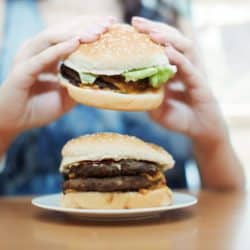
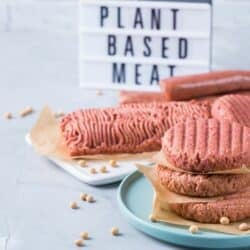




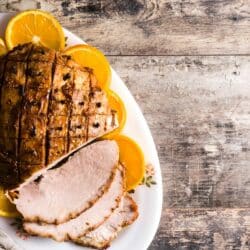







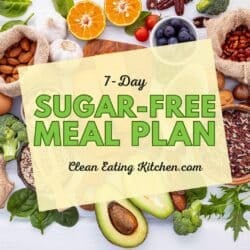



I am 40 yrs old and I’ve gained weight on top of being overweight anyways. Since age 39 and half I burp many times throughout the day and am bloated all the time. It’s either less estrogen floating through my system or the extra belly weight causes this. Anyways, our household has been vegan for close to 14 yrs, with the exception my kids and I ate eggs and maybe ice cream variably a couple times a week the first 9 years. Last 5 years I’ve kept my dairy to once a month in the form of a chocolate bar. Just recently, I’ve been tired of my bloating and craving meat so I’ve started to eat chicken at taco bell a couple times a week. (My husband is dead against meat eggs in our house after so long not having them) Anyways, I just feel like my vegan diet was for nothing. I had my labs done in 2021 and my cholesterol before adding any meat and just 1 dairy chocolate bar a month, my cholesterol was at 198. I don’t personally know what’s wisest where to go from here but my husband who has thyroid, kidney, and diabetes issues just started that no oil vegan high starch diet you spoke of that you were on for 2 years and keeps trying to get me to go on it. Anyways I appreciated your story for some perspective. Much love, Cynthia
From my own experience on keto, paleo, and then finally whole food plant based, oxalate overload can be a big problem. These diets are very high in oxalate containing foods which can wreak havoc on our bodies. Some people do well with them and others like myself very poorly. There are a lot of plant foods that contain a lot of oxalates which is an anti-nutrient.
No judgement, but it sounds like you approached veganism in a similar way as I did. My diet was heavily influenced by Instagram mom’s and raw food enthusiasts. I did not eat chips, bread, appetizers at restaurants…and I thought this was how it was done. I’m a different kind of vegan now. My decision to be vegan was always ethically based, but my approach was wrong. All of those social media influencers I followed have fallen off the wagon. But I have not. Because I’m in it for the animals. Because I eat bread, chips, fortified milks, I take my vitamins. My choice has allowed me a strong body and mindset, and a more ethical lifestyle. There’s no wrong in that. I agree, as vegans, we have much to consider, when getting started. But these things are easily remedied. I’m not at risk for heart disease, my blood pressure is always on point when I go for my annual, no Mercury build up in this body. And no animals needed for my ability to kick ass everyday.
This was great! Thanks for being honest about your own personal experience. Everyone everybody abs every soul is soo different! Finding what works for you is the most rewarding healing and healthy. God bless you and your life my friend.🙏🏼❤️NAMESTE
I’d like to take a moment to thank you for your very apparent “balanced and informed” to plant-based and vegan diets! My reason for appreciating your information is my tentative decision to go plant based at age 72. Because your view makes more sense for me personally…I will not. I’ve done so much research on plant based/ vegan and it always left “why” lingering in my mind. After learning about the treatment of animals, as well as how they’re raised and cared for left me feeling disgusted! But I now have tools I need to be balanced! Thank you so much!
One last thing…you did not bash either diet… you gave us the audience the basis to make an informed decision…sorry for my long spill🤓
Well I am so glad you came to the article with an open mind! I agree, the treatment of animals in most situations is horrible, but that’s why it’s so important to choose better sources. I do firmly believe that veganism is not the answer as it more often than not creates more problems than it solves.
Very well written article thank you.
I’ve been vegan for over 12 years, through pregnancy and breastfeeding a child for 4 years. My son has been vegan his entire life. The Academy of Nutrition and Dietetics says that a vegetarian diet, including vegan diets are safe for all stages of life. Several of the risks you mentioned here are just false and can be easily proven false with just a little bit of research. Of course vegans should take B12, animals are given B12 injections because most soils today are low in cobalt which ruminants need to produce their own B12. Some people should consider a DHA/EPA supplement particularly if they are low, but it has also been found that vegans are better at converting ALA to DHA/EPA. Getting these omega fatty acids from a plant based source is certainly healthier than getting them from fish which are high in heavy metals and PFAs. I would recommend the books Whole by Dr. T Colin Campbell, How Not to Die by Dr. Michael Greger and the Blue Zones by Dr. Dan Buettner. The Physicians Committee for Responsible Medicine (which includes thousands of licensed doctors and nutritionists) also has a website, podcast (The Exam Room) and app for anyone who is looking to switch to a plantbased diet.
Those are great resources and I agree that a small number of people can thrive on a vegan diet, but it’s not a natural diet and most people do not thrive.
Actually, you left out a part of the Academy’s statement, and it’s a dangerous omission. They don’t just say that a vegan diet is “safe for all stages of life”. No, they say “a WELL-PLANNED vegan diet is appropriate for all stages of life”. This is where my MD husband got alarmed – because what is their definition of “well-planned”? Does it mean “yes, I will include some broccoli and beans everyday”, or does it mean “I will follow a meal plan where nutritional values have been calculated”? Personally, I understood it the way you do, for a long time. Until I didn’t feel so good, and I installed an app that gives me my vitamin and mineral intake for all meals entered. Now, if you ask my family, they will tell you that I’m an extremely health-conscious person, eating tons of all kinds of veggies, nearly no sugars or oils, no refined grains, beans everyday etc. Imagine my shock when discovering that without a daily pound of broccoli, my calcium intake was mostly around 150mg a day. Iron mostly didn’t reach even half of the recommendations, nor zinc. So now there’s three possibilities: a) choose supplements b) follow a daily plan in order to eat everything like a calculator c) stop eating vegan.
It gets a lot worse when children are included. Because while I can tell myself that I need a pound of broccoli in order to meet my calcium needs, I will not convince my toddler of the same. He is picky. Even though he was raised this way. He is in no way eating a “balanced diet”. I can make him eat whole grains, fruit, nuts without problems. Veggies, with severe limitations. Supplements? He’s a kid, and most pediatricians will tell you that is not a great idea. However, if you place animal products in front of him, he will eat eggs, he will eat yoghurt, he will eat meat. No worry then about calcium and iron.
I also think it is more than dangerous to tell people that veganism for kids is fine “because my son has been raised this way and is four years old”. Any damage that might be inflicted on him will become apparent at an older age, not now. Nutritional deficiencies take a long time to show their face. For a grown person, doing this through their OWN conviction, it’s a different thing. But kids who need to GROW will need a lot that cannot be replaced later. Your peak bone density is around your twenties. It’s not a thing you can replace after that, because it’ll only go downhill from there! You can only stop it from getting less and less, but you cannot build what wasn’t there to begin with. So this might mean osteoporosis at a very young age, among many other problems. The fact that kids will survive this diet is not a great testimony to veganism but to the human body itself – after all, kids survive famines in many parts of the world. They might be losing teeth at an early age, experience stunted growth as a teeanger, develop illnesses then, but they mostly survive. But we all know that surviving is not thriving.
We have been vegan for 3 months now and I have gained weight. I feel bloated and chubby. Not like me at all. We started it to reduce fat intake due to my husband’s cancer. However I do not think it is the healthiest of diets to follow. Then, today, I was in my tap class and I saw myself in the mirror. I was chubby! Not good. Not happy. So I went to the store and got fish. I told my husband we will try to manage a low fat diet but with fish a few times a week. I agree with your section on lentils. I get so bloated and I void a lot afterwards. My thyroid peroxidase antibodies did go down 43 points and my Synthroid went from .125 to .112. But a vegan diet does not seem to be working for me. I’m bloated, chubby, and not happy with myself.
In theory, you could combine this and that grain to get the same nutrition as a beef steak without the bad things of read meat. Right. If only it worked like that in real life. You can tell by the lack of muscle mass and sunken eyes who is into that. The vegan style of eating is unhealthy. Period. On top of that, most practitioners behave like members of a cult. So glad you could make it out if it not just for the health of your body but of your mind as well.
You fail to say at what age you were when you became vegan and then got cancer. You fail to take into account all the years you are unhealthy and then have the audacity to say that a vegan diet isn’t healthy when you only gave it two years to clean up what an unhealthy diet had already done to your body! You should not publish against a healthy vegan diet. I literally proved to my 88 year old father who argued with me about this topic that plants are healing by healing ailments he had with plants even his physicians failed him!
I did not fail to take any of that into account. If you read the article I think you’ll get that message. But my points are valid and reflect my experience (and others). If a vegan diet is so perfect for everyone, why is there such a high recidivism rate? The point of this article is to point out that a vegan diet is neither natural nor appropriate for everyone. In fact, it’s likely not nutritionally appropriate for anyone, considering that vegans must go to such great lengths to avoid nutritional deficiencies.
If your argument is that people taking supplements is “going to great lengths” to stay healthy you should see the number of pharmaceutical and OTC drugs, as well as supplements, most non-vegans are taking especially as they reach their 40s and 50s. Even the supplements that vegans do take, such as B12, vitamin D and DHA/EPA are things just about everyone should be taking. Studies have shown only dairy products and fortified foods increase B12 levels, studies have shown basically everyone living in cold climates are low in vitamin D, studies have shown basically everyone is bad at converting ALA to DHA (with meat eaters because especially poor at this) and need to consume a supplement or eat more fish increase of red/processed meats.
Humans are omnivores, both from anatomical and physiological points of view as well as from body chemistry point of view – our bodies are perfectly equipped to consume variety of foods from systemic to cellular level.
Artificially removing naturally available nutrients from the diet is a form of an induced starvation, which, depending on the severity of it is lethal in either short or long term.
According to your perspective, being vegan and popping supplement pills is a natural way of eating. I’d suggest you ask for money back on all professional titles you have acquired.